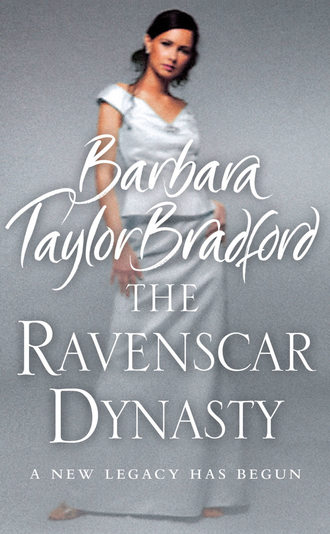
Полная версия
The Ravenscar Dynasty
TWO
Cecily Deravenel, matriarch of the family, was aware that Edward had followed Alice into the office. She had been walking along the minstrel’s gallery above the Long Hall when she had seen first one and then the other enter the room.
Neither Alice nor Edward had noticed her, and she had continued on her way, heading for the wide, curving staircase which led to the ground floor. As she was descending Edward had suddenly come out into the corridor in a great hurry and rushed into the Morning Room, closing the door sharply behind him.
Once again, Cecily’s presence had gone unnoticed, and this pleased her. She had no wish to confront her eldest son about his interest in the young widow whom she employed.
Cecily Deravenel had always been a good judge of character and she knew Alice Morgan very well. She trusted her to handle the situation with practicality, decorum and the utmost discretion, since she was well brought up, a proper young woman. Fully understanding that it was a passing fancy on Edward’s part, if it was anything at all, Cecily was nonetheless relieved that he would be going to London on Thursday, and then back to Oxford at the weekend. She knew how much Edward loved university life, and his studies would absorb him completely, as they always had. Also, his absence would bring the matter of Alice to a close, if it had not already died a natural death, or been terminated by one of them a few minutes before. Even if it had been non-existent, she was glad he was going. At Oxford he was safe.
She sighed under her breath. He could be wild, even reckless at times, acting impulsively, without considered thought. And, women of all ages found him utterly irresistible.
It had long ago occurred to Cecily that temptation was always under his feet and in his way; in fact, poor Edward was forever stumbling over temptation, more so than the average man.
It would take a saint to resist everything thrown in his face, she muttered to herself, as she stepped into the Long Hall, still thinking about her son.
Cecily was a tall and regal woman in her mid-forties, handsome, graceful and elegant. She was usually dressed in fashionable clothes even when she was here at Ravenscar, the family’s country seat.
This morning she was wearing a navy-blue wool day suit with a long skirt slightly flared from the calf, and a matching tailored jacket over a white cambric blouse with a high neck and frilled jabot. The jacket was short, ended at her narrow waist; it was cut in the style of the moment, with puffed sleeves which became narrow and tight from elbow to wrist.
Cecily’s hair was one of her loveliest features, a glossy chestnut which she wore upswept on top of her head; arranged in a mass of curls, these moved forward to the front, just above her smooth, wide brow. This was the latest and most fashionable style, as every woman in England, from every station in life, was copying Queen Alexandra. Ever since Queen Victoria’s son, Albert Edward, had ascended to the throne as Edward VII, his queen had become the arbiter of fashion, style and taste. Edward’s wife, a Danish princess by birth, was much admired by the public as well as those in the top echelons of society.
When Cecily was living at Ravenscar she wore little or no jewellery, unless there were house guests in residence or she and her husband were entertaining members of the local gentry. Today was no exception. Her choices were simple: small pearl earrings, her gold wedding ring and a fob watch on the lapel of her jacket.
Now Cecily looked at the watch and smiled. The small hand was just moving onto eleven. Her husband forever teased her, insisted that he could set his pocket watch by her, and in this assertion he was absolutely correct. She was the most punctual of women, and every morning at precisely this hour she set out on her tour of the downstairs rooms at Ravenscar.
What had begun when she was a young bride had, over the years, turned into a daily ritual when she was in residence here. She needed to be certain that all the rooms in this grand old house were warm and comfortable, that everything was in order with not one thing out of place. She was fastidious about this, as in most things.
Over twenty-six years ago, when she had come to Ravenscar as Richard Deravenel’s wife and the new mistress of the manor, she had at first been startled, then terribly saddened to find this Tudor jewel, glorious in its overall architecture and design, to be so utterly unwelcoming, so uninviting. The sight of it had filled her with dismay and she had baulked, momentarily.
The rooms themselves were of fine proportions, with many windows that flooded the interiors with that lovely crystalline Northern light. But unfortunately these rooms were icy cold and impossible to occupy for long without freezing to death. Even in summer the cold penetrated the thick stone walls, and because of the nearness of the North Sea there was a feeling of dampness, especially in the wet weather.
Richard had explained to her that the house was basically only suffering from neglect, that its bones were good, as was its structure. In effect, his widowed mother had grown parsimonious in her old age. She had closed off most of the house, since her children lived in London, and had occupied a suite of rooms which were easy and cheap to keep heated. The remainder of the house had been ignored, and for some years.
When walking through it, that day long ago, Cecily had quickly discovered that the warmest place to be was the huge kitchen, along with the small rooms which adjoined. It was in these rooms that the cook and staff lived, because of the warmth that emanated from the kitchen fire and ovens. All the other rooms were covered in dustsheets, closed off to the world.
Richard, trusting Cecily’s judgement, had told his young wife to do what she wanted. Within a week of her arrival she made sweeping changes. Every room was thoroughly cleaned as was every window; the walls were repainted, the wood floors polished. Fires were soon blazing in every hearth, and great quantities of wood were chopped, the logs stored in the cellars, so that fires could burn throughout the year if necessary.
In London, Cecily purchased beautiful Turkey carpets and the finest Persian and Oriental rugs from the most reputable importers, as well as beautiful velvets, brocades and other luxuriant fabrics in rich jewel colours. The rugs went down on the hardwood floors, the fabrics were cut and sewn into handsome draperies for the many windows, furniture was polished and reupholstered if necessary. Because she had fine taste, a sense of style and a good eye, within a few months Ravenscar had been transformed, brought back to vibrant life through Cecily’s tireless and loving ministrations.
In a certain sense, none of this happened by accident. Cecily Watkins Deravenel was accustomed to homes of great splendour, as the daughter of a titan of industry who had made an immense fortune in the industrial revolution of the Victorian age. She had grown up in a world of stunning beauty, amidst priceless objects of art, sculpture, great paintings, and fine furniture, as well as tremendous, almost overwhelming, luxury. And so it was these particular elements which Cecily sought to introduce at Ravenscar, because she herself loved them and was comfortable with them. She succeeded, although only in part in the beginning, because it took a great deal of effort and time to collect unique and beautiful artifacts. Only now, after twenty-five years of painstaking work, had she finally accomplished what she had set out to do so long ago.
One of Cecily’s latest innovations had been the introduction of electric light throughout Ravenscar, which she had installed several years earlier. Gone were the gas lamps at long last, finally abandoned and replaced with shimmering crystal chandeliers and bronze wall sconces which bathed the rooms in a refulgent glow during the day as well as at night.
Today, as she walked down the Long Hall, glancing around as she did, Cecily noticed damp patches near a line of windows facing the sea. She made a mental note to point them out to the handyman, so that they could be dealt with promptly.
Entering the corridor off the hall she opened doors to different rooms, looking inside, checking the fires, the state of the furniture, and the general appearance of everything. Sometimes she went inside, straightened a floor-length cloth, or corrected the way a curtain fell. And her eye, always keen, sought the slightest imperfections.

Half an hour later Cecily found herself standing outside the Morning Room, hesitating, debating whether to go in or not. Finally making up her mind, she turned the knob.
Three heads swung to face the door as she stepped inside…three of her four sons…three of her seven children. She had borne twelve babies but only seven had lived and grown up.
George, at eleven, was more irrepressible than ever, and failed to hide his feelings. He was grinning at her now, his face open and revealing. He came to see her constantly…to confide, even to admit his misdeeds and mistakes, but also to carry tales, and frequently she had thought he had a touch of envy in his nature, and perhaps even treachery as well. But this morning he looked positively angelic; with hair the colour of wheat, he was the blondest of all her children.
There was such a contrast between him and his brother Richard it was quite startling. There he was, sitting next to his adored Ned, his face so very grave, and now he offered her a solemn sort of smile, a sad smile for a little boy of eight. How steady his slate-grey eyes were; such a serious child, so dedicated in everything he did, her Richard. For a split second she wanted to ruffle his black hair, but she knew he would not appreciate that, because he would think she was babying him. He was the darkest in colouring of all her children, dark like her, and he had inherited some of her traits, her stoicism, her stubbornness particularly.
Finally, Cecily’s eyes came to rest on her eldest son. Edward, too, was smiling at her, a loving smile. His eyes were so vividly blue they startled her, but then they had since his childhood. His red-gold hair, inherited from his Normandy forebears, resembled a polished helmet above his face, and as his smile grew wider and his white teeth flashed she thought of those women who fell all over him—yet he was so young, still only a boy…not even nineteen…
For a long time she had believed that his inherent wildness did not negate his other qualities, especially his natural ability in so many areas. And he was very able. She never underestimated him, although his father occasionally did. Even so, her husband was fully aware, just as she was, that with Ned family loyalty was deeply ingrained in him, bred in the bone. Family came first; she knew it always would. She relied on it.
As Cecily stood there for a moment longer, she stopped ruminating about the three boys present, thought for a moment of her second son, Edmund, gone to Italy with his father several days ago. Edmund, who was seventeen, seemed the most responsible of her sons, and he had begged to accompany his father on this business trip. He was practical, had his feet firmly planted on the ground, and was very much his own man. It was his two elder sisters whom Edmund most resembled, at least in his colouring…They had light brown hair, hair which her fourteen-year-old daughter Meg characterized disparagingly as mousey. Meg was blonde, but not quite as blond as George.
Edward said, ‘Please come and join us, Mother, won’t you? We’ve been having a snack. Would you like to partake of something…a cup of tea perhaps? Should I ring for Polly?’
‘No, no, but thank you, Ned,’ she replied, walking across the floor to the sofa. As she seated herself on it, George jumped up and rushed across the room, fell onto the sofa next to her, leaned against his mother possessively. Automatically, she put her arm around him protectively. Years later she would remember this gesture from his childhood, and wonder why she had done this so often then. Had she somehow had a premonition that he would one day need protecting?
Ned ventured, ‘I wonder, Mother, if you know when you plan to return to town?’
‘In a week. I told your father we would all be waiting at the Mayfair house when he returned from Italy. Of course, you yourself will be at Oxford by then.’ She glanced down at George, lolling against her, and then across at Richard, before adding to Edward, ‘Mr Pennington will be joining us at the end of the month. He will tutor the boys as he did last year when we were in London. And Perdita Willis has been engaged as governess to tutor Meg. Where is she by the way? Have any of you seen your sister since breakfast?’
Ned and Richard shook their heads, but George spoke up, murmured, ‘I saw her going up to the attics.’
‘When was that?’ Cecily asked swiftly.
‘I can’t really remember the exact time, Mother.’
‘Force yourself,’ she said a little sharply for her.
‘Oh, about an hour ago,’ he muttered.
‘I wonder why she was going up there?’ Cecily frowned, looked puzzled.
‘Oh, heavens, Mother! I think I know why,’ Edward announced. ‘I’ve suddenly remembered. She told me her friend Lillian Jameson is being given a spring ball for her sixteenth birthday. Meg said she was going to look in those trunks up there—’ Edward broke off, glanced at the door which had opened to admit his sister.
‘There you are, darling!’ Cecily exclaimed, rising, moving towards her daughter Margaret. ‘I was just wondering where you were and Ned said you’d probably gone to look in those old trunks.’
‘Yes, I did, Mama,’ Meg answered, gliding into the room; she was as graceful as her mother, and she looked pretty this morning in a red wool dress, black stockings and black shoes.
Cecily knew Meg was blossoming into a very pretty girl indeed, and smiling at her youngest daughter, she murmured, ‘You didn’t mention that Lady Jameson is giving a spring ball for Lillian’s birthday.’
‘It’s not actually definite yet, Mother. The invitations haven’t gone out. And they won’t for weeks and weeks. If it happens at all. Well, you see…Lillian is hoping, and so am I. It might be rather fun, don’t you think? However, her mother hasn’t actually said yes.’
‘Are boys going to be invited?’ George asked, sitting up straighter, staring at her intently.
Meg laughed. ‘You’re incorrigible, George, truly incorrigible. Imagine you thinking you could be invited.’
‘Why not? I’m a Deravenel. We’re invited everywhere.’
‘The likes of Papa, not you,’ Meg said with cool authority. ‘You’re too young to go to cotillions, dances, that sort of thing.’
‘No, I’m not, am I, Mother?’ He gave her an appealing look.
‘Well, George, perhaps…at this moment, let’s say. By the spring you’ll certainly be a little older,’ Cecily replied quietly, wanting to mollify him.
‘There, you see, Margaret! Our mother says because I’ll be older by spring I could go. I’ll think about it, and maybe I will come after all…I shall give it considered thought, as Papa always says.’
Edward chuckled. ‘I hope you’ll ensure I get an invitation, Meg,’ he teased, winking at his sister, wanting to make light of all this, since George looked sulky.
She laughed and nodded. ‘Of course I will. And if you come you’ll be the envy of every other man there.’
He looked surprised. ‘Why?’
‘Because all the young women will be falling at your feet,’ George announced. ‘Everybody says you’re a ladykiller.’
‘That’s enough, George,’ Cecily cut in, although she spoke mildly. ‘None of that type of vulgarity here, if you please.’ Turning to Meg, she asked, ‘Well, did you find anything interesting in the trunks?’
‘Oh, yes, Mama, I did: some wonderful frocks, all beautifully packed away in cotton bags. They’re like new. Will you come and look?’
‘I’ll be happy to,’ Cecily answered, taking her daughter’s arm. Laughing, the two of them went out together.

The attics at Ravenscar were large, and ran the entire length of the house, under the eaves. Since she was such a stickler for cleanliness and perfect order, Cecily had them cleaned and dusted once a month. Because of this, it was easy to find everything, and her neatness and talent for organization meant easy access to the chests, boxes and trunks which were stacked there.
Earlier, Meg had taken out several gowns, and laid them across a sofa which had been covered in a dustcloth. The gowns were made of silk, a light featherweight silk, since they had been designed to wear over bouffant underskirts, or hoop skirts, which had been so prevalent in the middle of the Victorian era.
Meg ran over to the sofa and picked up one made of pale green silk and held it against her. ‘I thought this colour would suit me. What do you think, Mama?’
Cecily stood facing her daughter, studying her for a moment. Then she nodded her head. ‘I must agree with you, it’s a pretty colour and perfect for you. I am sure we can have several of them remodelled to fit you. Madame Henrietta is such a good dressmaker, and innovative, she’ll create more up-to-date designs.’ Reaching for another gown, Cecily handed it to Margaret. ‘Let me see how this shade looks: it’s such a lovely blue, it reminds me of cornflowers.’
‘And Ned’s eyes,’ Meg murmured as she took the dress, held it in front of her.
‘Ah, yes, that is true,’ Cecily acknowledged, Ned’s eyes indeed. They were close, Edward and Margaret, with only a few years difference in their ages. Meg, like Richard, adored her eldest brother. He could do no wrong as far as she was concerned, and for his part Ned was protective of her, had kept a watchful eye on her since childhood. In turn, it was Meg who took charge of her younger brothers when necessary, mothering them when Cecily was away, guiding them in so many different things.
‘The blue is enchanting,’ Cecily now exclaimed, liking the way the colour enhanced Meg’s grey eyes. ‘We shall take the green and blue to London with us next week, and before we leave do go through the other trunks. Perhaps you’ll find several more which can be remade.’
‘Oh, how kind, Mama, thank you so much.’ Margaret stepped closer to her mother and hugged her in a sudden show of affection, the silk frock crushed between them.
Cecily, who was not a particularly demonstrative person, began to laugh. ‘It’s my pleasure, but Margaret, my dear, you’re ruining the dress.’
Meg let go of her mother at once, and shook the frock out. ‘I don’t think any real harm has been done,’ she murmured, scrutinizing it with some intensity.
With her head slightly tilted to one side, Cecily studied Margaret for a split second, realizing once again how pretty she had become, with her flowing fair hair and those large grey eyes, which were so beguiling. Instantly Cecily’s thoughts turned to the girl’s future, her marriage prospects. Meg would grow into a lovely young woman, that was clear. And she would definitely make just as good a marriage as Cecily’s two eldest daughters Anne and Eliza had done.
‘I shall speak to Lady Jameson next week when we return to town, Meg, in an effort to ascertain what her plans actually are. It has suddenly occurred to me that perhaps your father and I should consider giving you a small afternoon tea dance later this year, to celebrate your fifteenth birthday.’
‘Oh, Mama, that would be wonderful!’ Meg was startled by this suggestion, which was so unexpected, but the happy smile on her face revealed her genuine pleasure at the idea.
Cecily had also startled herself. She was not usually so spontaneous or impulsive, and normally spent days in deliberation about important things such as this. She wondered if she had made an error in bringing up the idea of a party for Meg, but immediately decided she could not backtrack now without upsetting her daughter. She would talk to Richard next week, but she was perfectly certain he would make no objection. He had always been quite content to leave such matters to her…the raising of their children…the running of their homes.
Richard. Such a good man. So devoted to his family, a wonderful father. The best husband any woman could ever have. She could not wait for him to come home. Her life was empty without him by her side, and lonely.
She hadn’t really wanted him to go to Italy but he had felt obliged to do so. There was some sort of problem at the marble quarries they owned in Carrara, and as the assistant managing director of Deravenel and Company, he agreed with Henry Deravenel Grant, the chairman, that he was the best person to investigate the situation. And so off he had gone with Edmund, who had never been to Italy before and was genuinely excited about making the trip.
Her brother Rick and her nephew Thomas went along to keep her husband and son company; Richard and Rick had been extremely close friends for many years, enjoyed each other’s company and travelling together. Also, Rick hoped to buy some paintings and sculpture in Florence; he was in the process of remodelling his town house in London and only the very best in art and artifacts would do. He was something of a connoisseur and had a great eye, and he had said to her only two weeks ago that the thought of Florence made his mouth water.
Rick and she had been close since childhood, and after their father’s death it was Rick who had taken over the family business. If her father had been one of the greatest magnates in industry, then Rick had surpassed him a thousandfold; today he was one of the richest men in the country, and because of his flair and genius in business her own inheritance had increased. This was a great relief to Cecily. Her husband was always at odds with Deravenels when it came to money, and it was a company that really belonged to him at that. At least he should have been running it, not Harry Grant. Like all the Lancashire Deravenel Grants, he was incompetent when it came to finance. As for Harry’s French wife, Margot, she was a woman who was riddled with overriding ambition and greed who managed Harry like a puppet master and sought to run the company herself. She probably is running Deravenels, Cecily now thought, and more’s the pity.
‘Shall we take the frocks downstairs, Mama?’ Meg asked, interrupting her thoughts.
‘Oh, yes, of course, let us do that, my dear.’ Cecily looked at her fob watch and exclaimed, ‘Good heavens, it’s almost time for lunch.’ But as they went downstairs her mind went back to the Grants; they were never far from her thoughts. Henry Grant’s father had always cut her husband out, cheated him, and the hatred had escalated over the years. Now, Margot Grant was making things even more intolerable. There was going to be another battle between Richard and Henry, of that she was convinced.
THREE
‘There’s a sea fret coming up,’ Richard said, swivelling around on the window seat in Edward’s bedroom, and looking across at his brother. ‘I can’t see any of the fishing cobles out there, Ned, it’s thick like a fog.’
‘Well, it really is a fog in a sense,’ Edward responded. ‘A fret usually comes up when cold winds blow in from the sea over the warmer land, in summer too, sometimes, as well as winter,’ Edward explained, glancing up from the box of books he was packing. ‘And there wouldn’t be any fishermen out this afternoon, you know. Tonight perhaps, if the fog lifts, Little Fish.’
Richard grinned. He loved this name Edward had given him years ago; sometimes Ned called him Tiddler, which also meant little fish, and this pleased him. Having nicknames bestowed by Edward made him feel very special indeed. ‘I’ll be glad to go to London next week,’ Richard said, introducing another subject. ‘Even though I have to work hard because Mr Pennington is coming back to be our tutor.’







